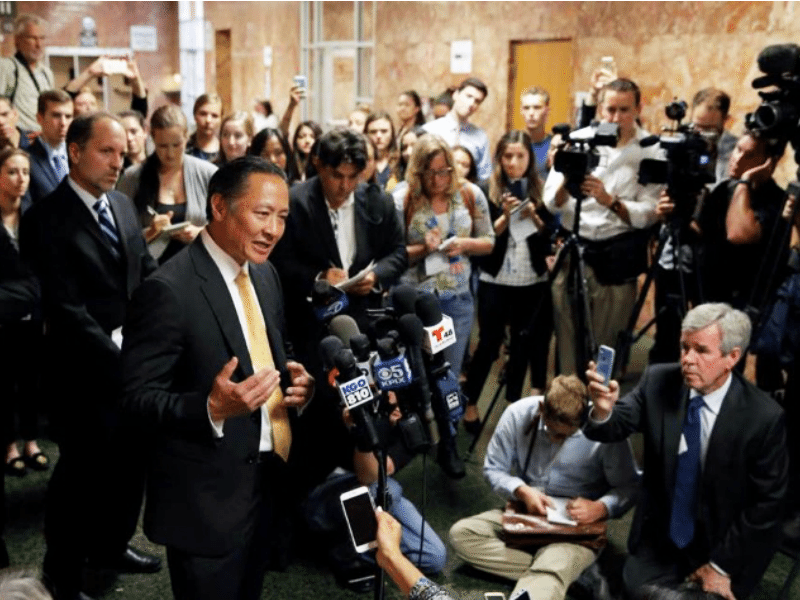
by Valerie Ibarra
San Francisco – Robert Chan, an attorney for the family of Jeff Adachi, is releasing three independent reports that raise serious questions about Jeff Adachi’s autopsy, which was conducted by the San Francisco Medical Examiner’s Office (OCME) in March 2019.
The independent reviews found the cause of death was “sudden cardiac arrhythmia and acute myocardial infraction due to coronary artery disease” and the manner of death was “natural.”
The autopsy was reviewed by Dylan V. Miller, M.D., who is an expert in cardiovascular and autopsy pathology, Dr. Nikolas Lemos, a forensic toxicologist, and James L. Norris, a consultant in forensic science.
The reviews question why, given the observed coronary artery disease, was the death originally deemed an “accident” due to “acute mixed drug toxicity” when the ethanol (alcohol) level was 0.01 percent and the trace amount of cocaine was detected only in the central (heart) blood, a generally unreliable sample without corroboration.
Mr. Norris noted that in the general practice of autopsy, blood is tested in peripheral parts of the body and that central blood from the heart “is avoided for forensic toxicology … [and] is not relied upon alone for detection, quantitation and the interpretation of any drug level.” Dr. Lemos, who used to work for the OCME, called the drug results drawn from Mr. Adachi’s central blood “toxicologically insignificant.” Dr. Miller said that he is “very familiar with the effects of cocaine on the heart,” and his own analysis “is consistent with Mr. Norris’s and Dr. Lemos’s conclusions.”
Dr. Miller stated in his report, “I can state with reasonable medical certainty that the presence of 80 percent narrowing of the left anterior descending coronary artery with early infarction seen in the myocardium are entirely sufficient to explain sudden cardiac death by natural causes.”
“It appears that the ethanol level should have been reported as negative and no cocaine was found in the peripheral blood sample. These results do not appear to support the stated cause of death,” Norris concluded.
Mr. Chan said: “Losing Jeff was a terrible tragedy, and his family has suffered so much. The family is heartened to know that nothing in Jeff’s autopsy revealed any indication of chronic drug use or overdose. It provides peace of mind that we did know Jeff better than the circumstances of his death have suggested.”
Some who are disturbed by the autopsy are pointing to a conflict of interest between Mr. Adachi and OCME Director of Operations Christopher Wirowek. In December 2018, just two months before Jeff Adachi died, he had submitted a formal complaint to the city administrator accusing Mr. Wirowek of lying about the OCME’s accreditation and failing to correct those false statements. Adachi called for an investigation, in which he suggested if Mr. Wirowek was found to have lied, “He should be terminated.”
Some who are disturbed by the autopsy are pointing to a conflict of interest between Mr. Adachi and Medical Examiner’s Office Director of Operations Christopher Wirowek. Just two months before he died, Adachi had called for an investigation, suggesting if Wirowek was found to have lied, “He should be terminated.”
The city administrator replied to the complaint by saying that the assistant district attorney was “subsequently apprised of OCME’s correct accreditation status,” which Mr. Adachi rebuked in a follow-up letter, three weeks before his death, claiming that the Public Defender’s Office was never so informed, despite requests. The city administrator’s response also noted that accreditation from the National Association of Medical Examiners (NAME) was “entirely voluntary.”
While that may be so, according to NAME’s website, “The standards represent minimum standards for an adequate medicolegal system, not guidelines.” Until Mr. Adachi raised the issue in 2018, all OCME correspondence read “ACCREDITED BY THE NATIONAL ASSOCIATION OF MEDICAL EXAMINERS,” showing that indeed the office knew the importance of the accreditation and the standards it represented.
Deputy Public Defender Danielle Harris said: “Our criminal legal system cannot work with a dysfunctional and untrustworthy medical examiner’s office. The office has been understaffed, politicized and operating in near secrecy for far too long. Grieving families, accused persons and indeed all San Franciscans deserve better.”
Ms. Harris was the attorney who initially requested information about the OCME’s accreditation in fall of 2018 when she was working on a homicide case. Despite claims attributed to Mr. Wirowek that the OCME had “provisional accreditation,” NAME was able to confirm that OCME’s accreditation had lapsed in January 2017, leaving the office unaccredited for the first time in over three decades.
Its previous “provisional” status was due in part to insufficient medical staff and chronic work delays. The lapse in accreditation and the OCME’s misrepresentations raised grave concerns about the credibility and management of the OCME.
Another layer of conflict lies in that Mr. Wirowek personally appeared at the scene of Mr. Adachi’s death and became highly involved in the investigation. According to the medical examiner/investigator’s report, Mr. Wirowek went to the hospital where Mr. Adachi had been pronounced dead, then met with Mr. Adachi’s friend who had granted him access to the apartment where Mr. Adachi had fallen ill and took photos of the friend’s call log.
Later that night, after legal access to the apartment was granted, Mr. Wirowek entered the apartment approximately five minutes after the police and took photographs of the scene that were submitted as part of the investigation.
It is unclear whether any of these circumstances may have influenced the OCME’s procedures or conclusions, but it seems that the intrepid Jeff Adachi may still be working on some unfinished business.
Valerie Ibarra, public information officer for the San Francisco Public Defender’s Office, can be reached at Valerie.Ibarra@sfgov.org.





